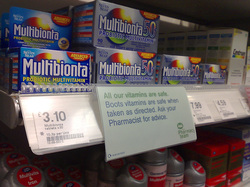 Iron One of the nutrients I get a lot of questions about in general is iron. Newly pregnant women are particularly concerned about their iron status and what impact that may have on their baby. In this blog, I will discuss why you don't need to worry too much about baby and how to ensure you both get enough. First thing to remember about the growing fetus is that it is very good at getting what it needs. Baby will stock pile as much iron as it needs in utero. Even for mothers with iron deficiency anemia, which affects almost 50% of pregnant women, studies have found that their babies were still born with sufficient iron. In general, healthy full term babies have enough iron stores to last for the first 6-12 months of life, especially exclusively breastfed babies. However, if you are found to be iron deficient it's still important to supplement because you need sufficient iron just as much as your growing baby. Why is Iron Important? During pregnancy, iron requirements double in order to build new red blood cells (RBCs) in Mom and the developing fetus. Iron also plays a role in cognitive and behavioural maturity, making hemoglobin and protein in RBCs that delivers oxygen to the body’s organs, muscles and tissues. Babies at risk for low iron stores: premature born (biggest grab for iron is in the third trimester), low birth weight babies (less than 6 lbs, 6 oz), babies born to mothers with poorly controlled diabetes during pregnancy, and babies fed cow’s milk instead of breast milk or formula during the first year. Iron Sources and Requirements If you look at the following, you will see that the daily requirement for iron is not a huge amount. The problem is, many people do not reach it daily and over time this will create a deficiency. Iron can be divided into two forms, heme and non-heme. Our bodies can absorb heme sources (15-35%) better than non-heme (2-20%). Dietary sources of heme are meat, chicken, and fish. Non-heme is in these and non meat foods (eggs, dairy, fruits and veggies). For the little ones iron has it’s highest absorption rate from breast milk (50-70%) due to the presence of Vitamin C and high levels of lactose in breast milk, as well as proteins lactoferrin and transferrin, help to increase absorption.
Other sources and their absorption rates: o Iron fortified dairy formula: 3-12 % o Iron fortified soy formula: 1-7% o Iron fortified cereal: 4-10% o Cow’s milk: 4-10% When supplementing to correct iron deficiency use a non-ferrous sulphate supplement (ferrous gluconate, chelate, or fumarate form). Ferrous sulphate is one of the most commonly used in supplements because it’s inexpensive, but it’s not absorbed well (absorption rate is only 10%). Make sure you take your iron with Vitamin C, as it increases the uptake of iron, and between meals. Calcium, black tea and some herbals [chamomile and peppermint], coffee or cocoa, oxalates found in some dark leafy greens, and other minerals can bind with iron and decrease absorption. If you're concerned about your iron status then talk to your Naturopathic Doctor today about putting together a plan that addresses your individual needs. References: Phillipson-Webb, L. 2010. Sprout Right: Nutrition from Tummy to Toddler. Penguin Canada. Romm, A. 2003. Naturally Healthy Babies and Children: A Commonsense Guide to Herbal Remedies, Nutrition, and Health. Celestial Arts. Skowron, JM. 2009. Fundamentals of Naturopathic Pediatrics. CCNM Press. Print.
0 Comments
Leave a Reply. |
Sarah Connors
I am a Naturopathic Doctor and Doula providing care in the Kitchener-Waterloo area. I have a passion for helping people with their health issues and improving the birth experience for Moms, and their babies. I also have a life long love affair with soccer, curling, and the alto saxophone. Archives
November 2020
Categories
All
|
Photos from Rural Royalty, manu flickr2010, Ryan Dickey, wocintechchat, huskyte77, paulswansen, Black Room Photography, harum.koh, Emery Co Photo, JeepersMedia, BrownGuacamole, wellnesswildflower, JeepersMedia, vastateparksstaff, colindunn, seelensturm, /\ \/\/ /\, 50mm.za, The Simpsons (Lee, Shirley, Luke and Rachel), AGRONAUTI, aivas14, Jonathan Rolande, winnifredxoxo, juhansonin, osseous, nan palmero, Theo Crazzolara, brianfagan, TP studio, wuestenigel, torbakhopper, anka.albrecht, Michael Stern, [-ChristiaN-], franchiseopportunitiesphotos, terren in Virginia, nateOne, barnimages.com, Dun.can, wuestenigel, @lattefarsan, amandabhslater, aphrodite-in-nyc, nutritionaldoublethink, Anne Worner, donnierayjones, mikecogh, angeloangelo, Rob.Bertholf, getaiwan, Lida Rose, matsuyuki, SurFeRGiRL30, marcoverch, amsfrank, mdaltry, nutrition education, Mike Prince, Edsel L, Neighborhood Nini, philipp.alexander.ernst, Mediocre2010, homethods, quinn.anya, Gamma Man, katerha, Eric Kilby, National Institutes of Health (NIH), rcmd_cfdfw_5_2, curtis palmer, Ray in Manila, frankieleon, Airsoftpal.com, byzantiumbooks, cchana, Brian Legate, Matt Lavin, BradHinton, monpetitchouphotography, wuestenigel, alexisjordanlewis, ByEPhotos, erix!, RLHyde, return the sun, quinn.anya, mliu92, frankieleon, loudista, Lyn Lomasi, upslon, derrickbrutel, cchana, National Institutes of Health (NIH), watts_photos, marcoverch, derrickbrutel, francesbean, weegeebored, Airsoftpal.com, Etwood, wu_135, shixart1985, Ingrid Taylar, VeritasFotografie, BioDivLibrary, emmanuelmorales1, Thanks for 1.5 Million Views!!, Will Merydith, reader of the pack, RoxyHobbs, Khanelle Prod' Medias, storyvillegirl, agromonitor, Arenamontanus, six:eleven, cote, SweetOnVeg, nenoirenediaz, lucianvenutian, markhillary, anotherlunch.com, inkknife_2000, archibald jude, rawtrigger, Imaginary Museum Projects: News Tableaus, Pavel P., Courtney Emery, Thien Gretchen, physiognomist, bark, Michigan Municipal League (MML), alberth2, Merelymel13, neofob, Care_SMC, Parker Knight, B*2

 RSS Feed
RSS Feed
